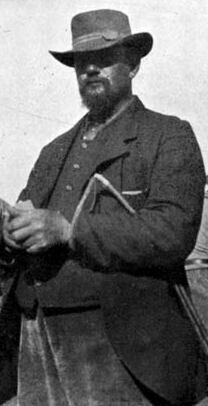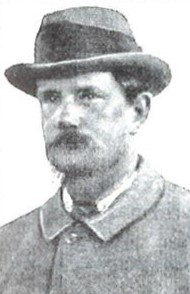Piet de Wet facts for kids
Quick facts for kids
Pieter Daniël de Wet
|
|
|---|---|
 |
|
| Personal details | |
| Born | 18 August 1861 Dewetsdorp, Orange Free State |
| Died | February 27, 1929 (aged 67) Lindley, Orange Free State, Union of South Africa |
| Nationality | Afrikaner |
| Spouses | Susanna Margaretha de Wet (18 September 1865, Kroonstad, Orange Free State, South Africa – 26 August 1924) |
| Profession | farmer, boer commander and general |
| Military service | |
| Allegiance | |
| Years of service | 1880..1902 |
| Rank | Commander, General |
| Commands | First Boer War (1880–1881), Second Boer War (1899–1902) |
Pieter Daniël de Wet (born 1861, died 1929) was a brave Boer general. He fought in the Anglo-Boer War (1899–1902). He was also the younger brother of another famous Boer general, Christiaan de Wet. Piet de Wet took part in important battles like Poplar Grove and Sanna's Post. He even defeated a British group called the 13th Battalion Imperial Yeomanry at Lindley. Later in the war, he decided to surrender to the British. He then joined the National Scouts, a group of Boers who helped the British.
Contents
Early Life and Career
Piet de Wet was born on a farm called Nuwejaarsfontein in Dewetsdorp. He was one of fourteen children. His parents were Jacobus Ignatius de Wet and Aletta Susanna Margaretha Strydom.
In 1879, Piet and his older brother Christiaan moved to the Heidelberg area. Both brothers fought in the First Boer War (1880–1881). Piet de Wet was part of the Battle of Majuba Hill. He also helped in an expedition to capture a leader named Mampuru II.
In 1883, Piet de Wet returned to the Orange Free State. He settled on a farm near Lindley. He married Susanna Margaretha de Wet. They had eleven children together, five sons and six daughters. From 1895 to 1897, he was a representative in the Volksraad, which was like a parliament. He later became a military commander, known as a veldkornet, for Lindley.
Fighting in the Anglo-Boer War (1899–1902)
Early Victories
In October 1899, Piet de Wet led 200 men from the Bethlehem Commando. They were near Nicholson's Nek during the siege of Ladysmith. He then received a task to attack Vaalkop in December 1899.
The president of the Free State, President Steyn, was very impressed with Piet de Wet. He gave him command of all troops south of the Orange River. Their main base was at Colesberg.
British troops kept moving forward and took Bloemfontein, the capital of the Orange Free State, in March 1900. In May, the British officially took over the Orange Free State and called it the Orange River Colony.
However, Piet de Wet and his brother Christiaan won some battles against the British. They had victories at Abrahamkraal, Sanna's Post, and Dewetsdorp. On May 31, 1900, Piet de Wet and General Marthinus Prinsloo captured the 13th Battalion Imperial Yeomanry near Lindley. Piet de Wet captured 530 men, including several important British lords. These captured soldiers were marched away to the eastern Transvaal.
After the British took Kroonstad in May 1900, many Free State soldiers felt discouraged. Piet de Wet also started to wonder if fighting on was still useful. The British then occupied Pretoria in June 1900.
Surrender and Later Role
In May 1900, British General Robert Broadwood heard that Piet de Wet might want to surrender. Piet de Wet wanted to surrender only if he and his men could go back to their farms. However, the British Commander-in-chief, Lord Roberts, demanded a surrender without any conditions. So, the fighting continued.
But in July 1900, Piet de Wet and some of his officers surrendered to the British at Kroonstad. They became known as "joiners" or "hands-uppers," meaning they stopped fighting and sometimes helped the British.
In January 1901, Piet de Wet wrote a letter to his brother Christiaan de Wet. He asked Christiaan to stop his guerilla war. This letter was published and became famous. In March 1902, Piet de Wet helped create the Orange River Colony Volunteers, a group that fought on the British side. He also joined the National Scouts, led by Andries Cronjé. These were Boer soldiers who helped the British army.
However, peace talks began in April 1902 at Vereeniging. These talks led to the Treaty of Vereeniging on May 31, 1902, which officially ended the war.


